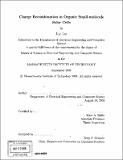Charge recombination in organic small-molecule solar cells by Jiye Lee.
Author(s)
Lee, Jiye
DownloadFull printable version (7.443Mb)
Other Contributors
Massachusetts Institute of Technology. Dept. of Electrical Engineering and Computer Science.
Advisor
Marc A. Baldo.
Terms of use
Metadata
Show full item recordAbstract
To enhance the power conversion efficiency in organic solar cells, charge recombination loss needs to be minimized. First, we perform transient absorption spectroscopy to study the charge recombination dynamics of thin film bulk heterojunction of the archetype organic solar cell molecules, copper phthalocyanine (CuPC) and 3,4,9,10-perylenetetracarboxylic bis-benzimidazole (PTCBI). We report the formation of triplet excitons on PTCBI molecules, which may be an important source of recombination loss in CuPC/PTCBI photovoltaic cells. Second, spin-forbidden transition can be employed to reduce the recombination loss in organic solar cells. We show with a simulation that the spin-disallowed recombination process increases the charge collection efficiency. Also, we present an experimental result that may imply the spin-dependent open-circuit voltage in organic bilayer photovoltaic devices.
Description
Thesis (S.M.)--Massachusetts Institute of Technology, Dept. of Electrical Engineering and Computer Science, 2008. Includes bibliographical references (leaves 39-40).
Date issued
2008Department
Massachusetts Institute of Technology. Department of Electrical Engineering and Computer SciencePublisher
Massachusetts Institute of Technology
Keywords
Electrical Engineering and Computer Science.